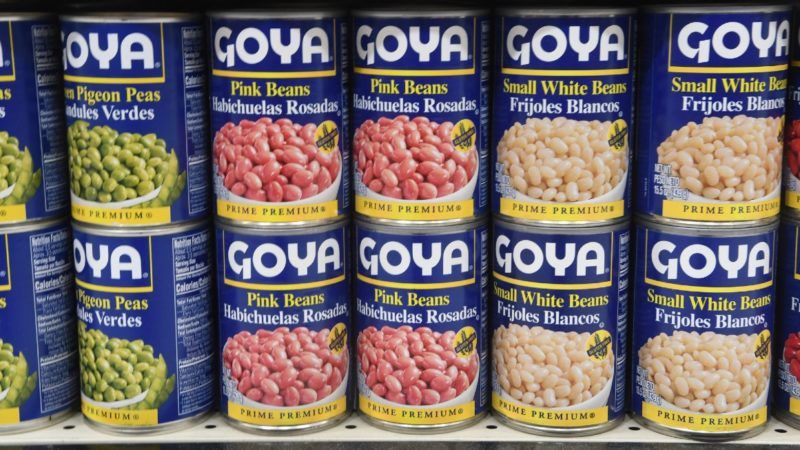Goya Boycott: Everything Is Political Now
Politics are even in our soup.

In Spanish, there is an idiom that refers to finding things "even in one's soup," when they are overbearingly ubiquitous. As U.S. politicians and activists enter day seven of a battle over canned beans and adobo seasoning, cancel culture and political point-scoring are undeniably hasta en la sopa.
Speaking as a guest in the White House on July 9, Goya Foods CEO Bob Unanue praised President Donald Trump for being a "builder" and said Americans were "truly blessed" to have him as a leader.
Faster than you can say "cancel culture," famous progressive Latinos took to Twitter, invoked the spirit of Roman Emperor Caracalla, and executed Unanue's and thereby Goya's damnatio memoriae.
"Oh look, it's the sound of me Googling 'how to make your own Adobo,'" tweeted Rep. Alexandria Ocasio-Cortez (D–N.Y.) about a popular Goya product. Hamilton creator Lin-Manuel Miranda wrote that "we learned to bake bread in this pandemic, we can learn to make our own adobo con pimienta. Bye." Former Housing and Urban Development Sec. Julian Castro added that "Americans should think twice before buying their products," as he used the hashtag #Goyaway.
As the boycott against Goya gained steam on social media, Unanue took to Fox News to claim his right to free speech was being constrained. This misses the point, since calling for an economic boycott also constitutes free expression. More troubling is when members of Congress like Ocasio-Cortez and former high-ranking bureaucrats such as Castro use their power and influence to punish a private business in order to score partisan points.
Meanwhile, Republican former Arkansas Gov. Mike Huckabee tweeted that leftists need no beans since "their speeches and whining already produce all the gas the planet can take." Ivanka Trump posted a photo in which she "endorses" Goya products ("if it's Goya, it has to be good"), only to be immediately accused of violating government ethics rules. Even the president tried to score partisan points on the food fight, staging a photo-op with Goya products in the Oval Office, an endorsement that arguably skews free-market competition since Goya's competitors have not been boosted in public by the commander in chief as a thanks for praise.
Among the sins that justify the uproar against Unanue in progressives' eyes are his past donations to Republican politicians such as former New Jersey Gov. Chris Christie, even though Unanue has also donated to Democratic Sen. Robert Menendez (N.J.). Unanue even mentioned his previous appearance at the White House under President Obama in 2011, when he said he was "honored and humbled" to be in the former president's presence. In 2012, Goya also took part in Michelle Obama's "Let's Move!" initiative, designed to provide parents "with the information they need to make healthy choices." None of which led to calls for Goya's cancellation.
The #GoyAway movement seeks to categorize all Hispanics into a single, monolithic ethnic group, whose members are capable of thinking only within the strict boundaries that their betters in politics and the media assign to them. Forget that, according to the Pew Research Center, a significant minority of Hispanics tend to vote Republican; perhaps they're not worthy of decent peppered adobo.
Many of those boycotting Goya are doing so because they disagree with the president's stance on immigration and racial issues that impact Latinos. But the boycott will end up disproportionately hurting immigrants and Latinos. Goya employs 4,000 people, and as Unanue said in May, well before the current Twitter storm, "All the employees are family working together for the same purpose. Many of us are immigrants and we extend a hand to our brothers." Unanue also announced at the White House that Goya was donating 2 million cans of its products to food banks in order to ease the plight of the worst-off during the pandemic.
This raises the question of who brings more lasting value to U.S. Latinos and the nation at large: the country's largest Hispanic-owned business, which exemplifies the American dream of immigrant wealth and job creation through hard work, or the cadre of politicians and celebrities who are eager to play politics with photos of canned coconut milk.
Goya will likely be fine, but politicians and activists warring over supermarket products should leave a bad taste in everybody's mouth. An omnipresent politics is especially dangerous because, as Argentine writer Jorge Luis Borges commented, the best government is an invisible one.
"We arrived in Switzerland in 1914," Borges said about his family's stay in the Alpine country, "and like good South Americans, we asked the president's name. They could only stare at us, because nobody knew the answer."
The detached approach to politics of the Swiss was striking compared to Latin Americans' obsession with caudillos such as Juan Domingo Perón in Borges' Argentina and, more recently, Cuba's Fidel Castro or Venezuela's Hugo Chávez. All were domineering figures whose unwelcome presence in daily life was sadly unavoidable for any civilian.
Whether you prefer Goya's seasoned stews or chicken noodles, when politics begins to pop up in your soup you can be sure that everyone has taken a step in the wrong direction.


Show Comments (203)